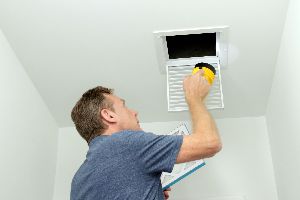How to Choose the Right HVAC Filter for Your Home

If you have a central air system, your heating and air conditioning units share a single air filter, which catches airborne contaminants and allergens and prevents them from being dispersed around your home. However, it also ensures proper operation by allowing a sufficient flow of air through the HVAC system. Ideally, the filter should be changed at least once per season, but they come in many sizes and variations, so it can be difficult to know what kind to get. Here’s what you need to know to help you make the right choice.
Size
Your current filter should have its size information printed directly on it, but you could remove it and take it with you for comparison. If it doesn't have this information, you'll need to measure the space between the bottom of the filter receptacle to the top before measuring the thickness of the slot. You should also place the measuring tape at the back of the receptacle and measure to the front. You'll end up with three separate measurements, which will correspond to numbers on the filter label.
Type

There are several different types of filters available, and each offers different benefits. Fiberglass provides moderate protection from household contaminants and should only be used in homes without pets or people with allergies. Pleated filters, meanwhile, are more effective at trapping small particles of debris, including dust and pet dander. However, high-efficiency particulate air (HEPA) filters have the greatest protection against various contaminants, including mold spores, bacteria, and viruses and are equipped to absorb tiny particles in the air, making them essential in homes with multiple pets or people with severe allergies.
MERV Rating
The Minimum Efficiency Reporting Value (MERV) rating indicates how effective the filter is at absorbing particles and keeping them out of your home. These numbers range from 1 to 16, with 16 being the best. While you might naturally assume that the highest MERV rating is the best, these filters are also the thickest. If your HVAC system cannot push air through the filter, the operation will become far less efficient. Generally, most homes should be equipped with a MERV rating between 5 and 8, although you can go up to 12 if you have severe allergies. The higher MERV ratings are used for commercial HVAC systems.
If you need to schedule an HVAC system tuneup, discuss your filter needs with a repair professional. Backed by more than 38 years of experience, Williamson Air Conditioning is proud to serve residents of Baldwin County, AL. In addition to repairs and new installations, these technicians provide preventive maintenance programs that come with a 10% discount on parts. They're also available 24/7 in case an urgent HVAC issue arises. Visit the website to learn more about their maintenance programs, or call (251) 981-3872 to schedule an appointment today.
About the Business
Have a question? Ask the experts!
Send your question

